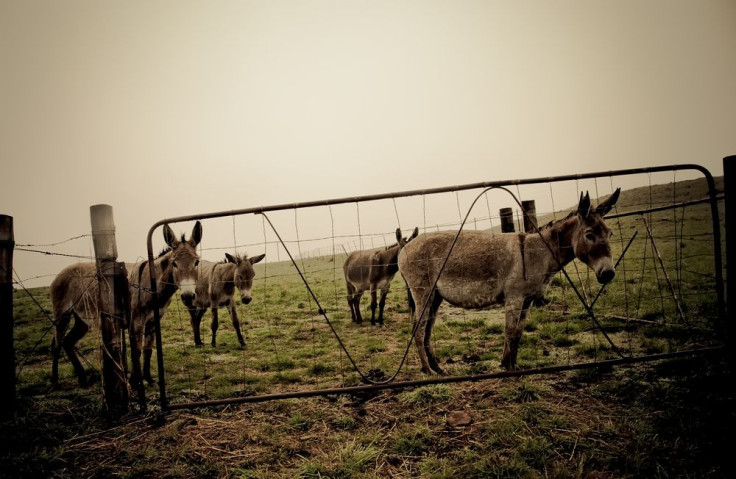Slaughterhouse One: Kenya To Open Donkey Abattoir To Feed Chinese Meat Demand

Kenya will soon open its first licensed donkey slaughterhouse – an abattoir that is expected to provide an economic boom to the lakeside village of Maraigushu in Naivasha, just northwest of Nairobi, and feed the growing demand of Chinese consumers who feast on the meat. According to the Kenya Standard newspaper, Kenya will be opening the slaughterhouse in early March after seeing huge demand coming from China, one of the country’s largest trading partners.
In the past, unregulated and independent donkey slaughtering hurt local water vendors in Naivasha, who use the beasts of burden for deliveries. Indeed, such illegal slaughtering activity, which has become common in the area, has residents growing accustomed to the sight of donkey carcasses littering roadsides and bushes.
The new facility, which boasts modern equipment and proper waste disposal techniques, promises to solve that unsightly and unhealthy problem, by legally obtaining, slaughtering and disposing of donkey’s used parts, while also boosting the local economy. According to the proprietor, John Ngonjo Kariuki, the slaughterhouse cost at least 15 million shillings (roughly $173,000) to construct, and is expected to employ more than 30 workers while also indirectly benefiting dozens of related laborers in the village. “I have been to China, where there is a high demand and market for donkey meat, and this slaughterhouse will take care of that,” Nariuki told the newspaper. “The slaughter of donkeys has been legalized by the [Kenyan] government for some years.”
Nariuki will be sourcing the donkeys not only from their local Naivasha community, but also from the Pokot and Turkana regions of Kenya – all told, Kenya has an estimated 2 million donkeys. While an official slaughterhouse will be the first of its kind in the county, it has been legal to sell the meat in Kenya since 1999. “The government has legalized the sale of donkey meat… [but] we did not have a legalized slaughterhouse in the country,” said Dr. Enos Amuyunzu, the Naivasha sub-county veterinary officer.
But some worry that while the new slaughterhouse would solve the problem of the illegal slaughter of donkeys and improper disposal, different problems may arise. For example, some local water traders are concerned that their donkeys will become targets. “We … fear that the same people who have been slaughtering our donkeys could turn to stealing them, as there is a ready market,” said water vendor Jose Wa Funda.
Donkey meat is a popular snack food in some areas of China, although it accounts for a small portion of total meat consumption. In 2011, China’s livestock industry yearbook reported that China slaughtered over 2.4 million donkeys. However, a recent food scandal from earlier this year found that donkey meat snack products purchased at local Wal-Mart supercenters contained traces of fox meat, perhaps suggesting that the Chinese may need to start importing the meat from Kenya.
Separately, some voices in Kenya worry that the slaughtered donkey meat (which for the time being is designed solely for export) may end up in domestic kitchens and dining rooms, masquerading as some other kind of meat, including beef and mutton. In fact, some observers suspect that the meat has already inadvertently found its way into the Kenyan appetite. “Once a donkey is slaughtered one cannot tell the difference between its meat and that of a cow -- and many [people], mainly in Nairobi, have fed on donkey meat,” one trader told the Standard.
Also, a number of Kenyan politicians have expressed their outrage over the abattoir. The Standard newspaper reported that Nakuru County Senator James Kiarie Mungai exclaimed: “Is this thing real? What kind of license do the owners have? Does it mean now that because dog meat is eaten in some parts of the world, we should go ahead and legalize it?”
Further, the Africa Veterinary Technical Association opposes the operation of the slaughterhouse, saying it fails to meet international standards. “We have for years many ignored donkey meat… and yet the consumption is going on in a clandestine manner,” said AVTA Chairman Benson Ameda. “This slaughterhouse does not qualify to be an export one, and the code of inspecting donkey carcasses is not yet developed.”
However, the deputy chairman of the Kenya Veterinary Association, Samuel Kahariri, called the slaughterhouse a “viable” idea, noting that Kenyans have been eating donkey meat for years. “For many years some people were not eating pork but slowly the number is picking up just like that of donkey meat,” he said. The Standard also noted that donkey meat is eaten openly only in the Turkana and Pokot regions, where it is savored as a delicacy.
(Note: Donkeys in the field photo by Shutterstock.com.)
© Copyright IBTimes 2025. All rights reserved.






















